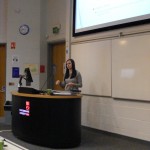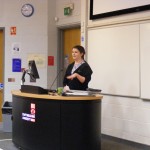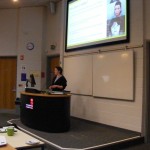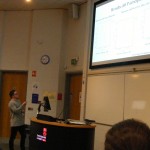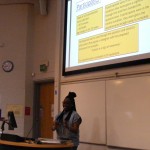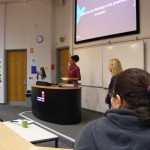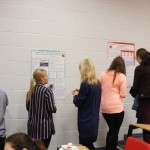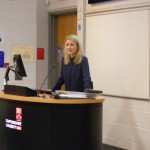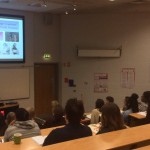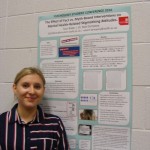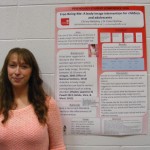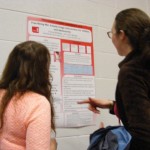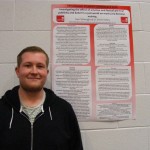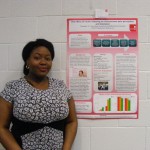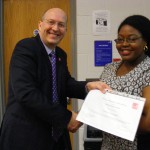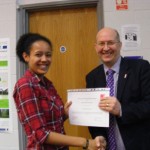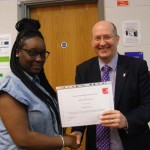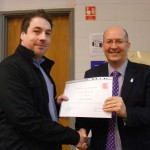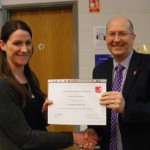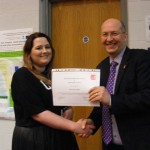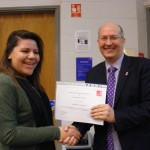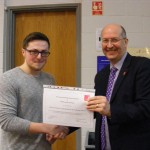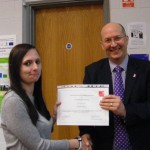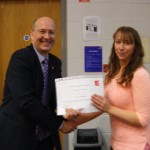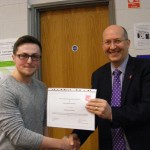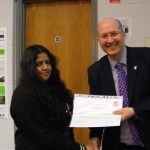The Psychology department at Staffordshire University organised a successful community event, “Weird and Wonderful Psychology”, hosted in the University’s £30 million Science Centre in December 2015. Dr Robert Dempsey and Dr Nichola Street report on a highly entertaining “Weird & Wonderful Psychology” event:
 Our event showcased some of the more unusual, fantastic and quite odd aspects of Psychology to an audience of visitors from the general public, students from local sixth form colleges, as well as staff and students from Staffordshire University. The event including a range of live demonstrations featuring the industry standard equipment used by staff and students in the Psychology department’s teaching and research activities.
Our event showcased some of the more unusual, fantastic and quite odd aspects of Psychology to an audience of visitors from the general public, students from local sixth form colleges, as well as staff and students from Staffordshire University. The event including a range of live demonstrations featuring the industry standard equipment used by staff and students in the Psychology department’s teaching and research activities.

A Busy Science Centre
These demonstrations included the use facial ageing software to show visitors the potential effects of alcohol and smoking on facial appearance (as used in our health psychology research), using goggles to show the effects of macular degeneration and alcohol use on performance on simple day-to-day tasks, mindfulness-boosting activities, and whether we can use physiological measures of the stress response to detect when people are lying.
We even subjected the Head of the School of Psychology, Sport & Exercise, Dr Peter Jones, to our Human Lie Detector study – who was ably caught out by our Dr Gemma Hurst’s skills at detecting when he was lying!


In addition to demonstrations by our Psychology lecturers, the event also included a number of demonstrations devised and performed by our Second Year Undergraduate Psychology students. Our students were tasked with designing and pitching their Weird & Wonderful demonstration as part of their Social Psychology module seminars, with the winners demonstrating their activity live on the night including delivering a short talk in front of our invited guests.

Our “MindControllers” Student Group – investigating obedience and conformity!
Needless to say, our students did a fantastic job of performing their demonstrations on the night, including explaining how their activity demonstrates psychological phenomena to our invited guests. Our students demonstrated how we can unknowingly change our behaviours to authority figures, whether particular personality traits make for better leaders, how we can conform to perceived norms and obey authority figures, the “Chameleon Effect” when we change our expressions to match those of other people during “selfies”, through film showing how we can’t always see things changing in front of our eye known as “Inattentional Blindness“, and the power of stereotyping other people based on their appearance (see below for pictures).


The Great British Psychology Bake-Off!
As part of the evening’s activities, a Psychology bake-off competition was held which featured assorted cakes and baked goods demonstrating various aspects of Psychology. Including Sigmund Freud Mince Pies, a Brain cake, the Big 5 Personality Traits, The Muller-Lyer Optical Illusion, gingerbread people demonstrating Twin Studies and Gender Stereotyping, as well as a unique set of cakes demonstrating a positive correlation (and a statistical outlier!) which were voted the winner of the Bake Off!
 Voting & Talks on Weird & Wonderful Psychology!
Voting & Talks on Weird & Wonderful Psychology!
The event culminated in the attendees voting for the best student demonstration from the evening – with The Mind Controller’s winning first place with their demonstration exploring how individuals’ behaviour can be influenced and exploring the psychological fields of conformity and obedience. The event also featured a series of short talks by lecturers from the department on their research interests relating to the weirder and unusual aspects of Psychology, including Dr Daniel Jolley on “Climate Change is a Hoax! The Psychology of Why People Believe Conspiracy Theories”, Dr Andrew Edmonds on “Jesus in Toast – Why People see Faces in Unusual Places”, and Mel Hall on “Who You Gonna Call! Ghostbusters? The Psychology of the Paranormal”. All talks were well received by the audience and showcased some of the interesting and exciting research happening in the department.

Mel Hall’s Talk on Parapsychology
Mel even gave a live demonstration of her psychic abilities by asking the audience to guess which number she was thinking of, with the majority correctly and spookily guessing “7”! Although there was a slight twist – our staff and students kept repeating the number 7 during the earlier demonstrations, so we’re not completely sure whether our colleague Mel is really psychic despite her claims otherwise!
The evening was a fantastic and very enjoyable event, and we were very pleased to see our guests getting enthused about Psychology and very proud of our students who presented their demonstrations in an engaging and professional manner.
Judy David, Academic Group Lead for Undergraduate Psychology at Staffordshire University, commented: “I was proud of how enthusiastically students and staff approached this event. So many people contributed, and it was great fun to be able to show off some of the more strange aspects of Psychology to both the public and our own students. There were some very interesting and stimulating activities and talks. I’m already looking forward to next year!”
Dr Peter Jones, Head of the School of Psychology, Sport & Exercise, said: “I really love our Weird and Wonderful event. It’s great how it allows our students to showcase the importance of Psychology and how touches every part of our lives, plus it also involves the wider public as Staffordshire University is such an important part of our community”.
The School of Psychology, Sport and Exercise at Staffordshire University is a leading School in the UK for Psychology degrees and is situated in the heart of England. We produce internationally recognized research which is driving knowledge in this area forward and we work with a variety of healthcare providers, charities, international sports teams and private sector organisations.
For more information or details of the wide range of Psychology degrees on offer at Staffordshire University please visit our website and our courses page.





